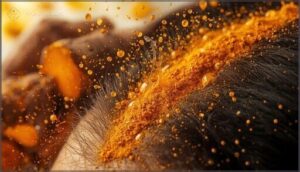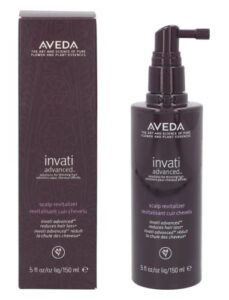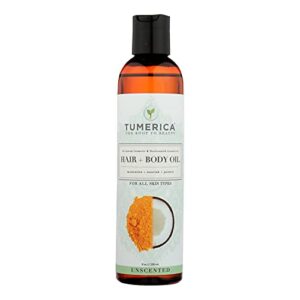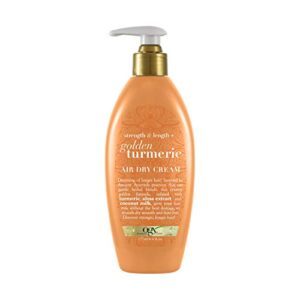This site is supported by our readers. We may earn a commission, at no cost to you, if you purchase through links.
Your grandmother’s turmeric remedies weren’t just folklore—that golden spice she mixed into hair masks contains curcumin, a compound researchers now recognize for its anti-inflammatory and antioxidant effects on scalp tissue. While turmeric has been used in South Asian hair care practices for over a millennium, modern trichology confirms what traditional medicine practitioners already knew: this vibrant root tackles multiple scalp concerns simultaneously, from inflammation-driven hair loss to fungal overgrowth that causes persistent dandruff.
The science behind turmeric for hair benefits reveals how its active compounds protect follicles, reduce oxidative stress, and create an environment where healthier hair growth becomes possible.
Table Of Contents
- Key Takeaways
- What is Turmeric and How Does It Affect Hair?
- Key Benefits of Turmeric for Hair
- Turmeric for Hair Loss Prevention
- Using Turmeric to Treat Dandruff
- Promoting Hair Growth With Turmeric
- How to Use Turmeric for Hair Health
- Top 3 Turmeric Hair Products to Try
- Precautions and Side Effects of Turmeric for Hair
- Frequently Asked Questions (FAQs)
- Can turmeric help with scalp conditions such as psoriasis or eczema?
- Does turmeric have any side effects when used on the hair?
- Can turmeric change natural hair color permanently?
- How often should turmeric treatments be applied?
- Does turmeric work on all hair types?
- Can turmeric be combined with chemical treatments?
- Whats the best way to remove turmeric stains?
- Conclusion
Key Takeaways
- Turmeric’s curcumin compound delivers anti-inflammatory and antioxidant effects that reduce scalp inflammation, protect hair follicles from oxidative stress, and combat microbial overgrowth causing dandruff—mechanisms validated by clinical research after millennia of traditional use.
- Topical turmeric applications work better than oral supplements for hair concerns because curcumin has notoriously low bioavailability when ingested, making scalp-direct delivery through masks, oils, or formulated shampoos the most effective approach.
- The same yellow pigment that gives turmeric its therapeutic power creates practical challenges—curcumin stains lighter hair and skin temporarily, requires patch testing to avoid allergic reactions, and needs proper formulation with carrier oils or penetration enhancers to penetrate scalp tissue effectively.
- Turmeric targets hair loss at its source by calming the inflammatory pathways that trigger follicle miniaturization and premature shedding, creating an environment where healthier regrowth becomes possible rather than just masking symptoms.
What is Turmeric and How Does It Affect Hair?
You’ve probably seen turmeric in your kitchen spice rack, but this vibrant yellow root has been working behind the scenes in traditional medicine for thousands of years. The same compound that gives turmeric its distinctive color—curcumin—also delivers powerful anti-inflammatory and antioxidant effects that can transform your scalp health.
Let’s break down what turmeric actually is, how its active ingredients work, and why cultures across the globe have trusted it for hair care long before modern science caught up.
Origins and Properties of Turmeric
Turmeric—scientifically known as Curcuma Longa—is a rhizomatous herb from the ginger family, native to South Asia where it’s been cultivated for over a millennium.
This golden spice isn’t just for your curry; its roots contain curcumin, the pigment responsible for that vibrant yellow-orange color and the compound behind turmeric’s antioxidant and antiinflammatory properties that traditional Ayurvedic medicine has harnessed for centuries.
Understanding the importance of clear science information is essential for evaluating the benefits of turmeric.
Key Active Compounds (Curcumin)
At the heart of turmeric’s effects sits curcumin, the principal bioactive molecule driving those researched anti-inflammatory and antioxidant actions on your scalp. However, curcumin bioavailability remains notoriously low when taken orally, which is why topical turmeric extracts or nanoparticle delivery systems often work better for hair applications.
Consider these factors when evaluating products:
- Curcumin stability degrades quickly without proper formulation
- Encapsulation techniques protect the molecule from breakdown
- Concentration matters—dilute extracts won’t deliver clinical effects
- Liposomal or nanoemulsion forms penetrate scalp tissue more effectively
- Bioactive molecules like curcumin modulate inflammation pathways (NF-κB) that influence follicle health
When evaluating the efficacy of turmeric for hair benefits, it’s vital to examine the research methodology to assess the validity of the findings.
Historical Use in Hair Care
Long before modern clinical studies validated its effects, ancient beauty traditions across South Asia relied on turmeric as a cornerstone of herbal remedies for scalp health. Ayurvedic medicine documented turmeric benefits in texts dating back thousands of years, prescribing paste-based preparations that combined this golden root with oils and herbs.
These traditional practices spread along trade routes, cementing turmeric’s cultural significance in natural hair remedies across multiple regions.
Key Benefits of Turmeric for Hair
Turmeric’s power lies in curcumin, the compound that gives this root its signature yellow color and therapeutic punch. When you apply it to your scalp and hair, you’re tapping into properties that have been studied for their ability to address common hair and scalp concerns.
Here’s what the research shows about turmeric’s three primary mechanisms of action.
Anti-inflammatory Effects on Scalp
Your scalp’s inflammatory cascade—redness, itching, irritation—can sabotage hair health, but turmeric’s curcumin fights back by blocking NF-kB signaling and reducing cytokines like IL-6 and TNF-alpha. This anti-inflammatory powerhouse addresses the root cause of scalp discomfort:
- Inhibits COX-2 pathways that fuel inflammation
- Decreases sebaceous gland hyperactivity linked to flaking
- Alleviates dermatitis-related edema and pruritus
- Bolsters barrier function during inflammatory insults
Turmeric benefits extend beyond symptom relief to genuine inflammation reduction.
Antioxidant Protection for Hair
Free radical damage accelerates hair aging, but curcumin’s antioxidant properties neutralize reactive oxygen species and boost endogenous antioxidant enzymes like superoxide dismutase in your follicles.
This scalp protection shields keratinocytes from oxidative stress, preserves cell integrity under UV assault, and reduces lipid peroxidation—mechanisms that directly support hair follicle health and resilience against environmental aggressors threatening your strands.
Antimicrobial and Antibacterial Properties
Your scalp’s microbial balance depends on antimicrobial defense, and turmeric compounds deliver precisely that. Curcuminoids inhibit Staphylococcus aureus and Escherichia coli at concentrations between 0.5 and 2 mg/mL, while turmeric’s essential oils target dermatophytes and bacteria colonizing your follicles.
These antibacterial and antifungal effects suppress Cutibacterium acnes growth, reducing bacterial load on treated areas:
- Bacterial inhibition protects follicles from inflammatory triggers
- Antioxidant properties support tissue repair during microbial challenges
- Essential oil compounds eliminate scalp-dwelling pathogens
- Synergistic antimicrobial effects augment conventional treatments
- Improved scalp health emerges from balanced microbiome populations
Turmeric for Hair Loss Prevention
Hair loss doesn’t happen in a vacuum—it’s usually your body waving a red flag about inflammation, hormonal shifts, or compromised follicle health. Turmeric’s curcumin works at the root level to calm these underlying triggers before they spiral into visible thinning.
Here’s how turmeric targets the real culprits behind hair loss.
Reducing Inflammation and Follicle Damage
Chronic inflammation attacks your hair follicles like a silent saboteur, triggering miniaturization and premature shedding. Turmeric benefits include powerful anti-inflammatory effects through curcumin, which blocks inflammatory pathways and protects follicle repair mechanisms.
As an antioxidant, it neutralizes free radicals damaging your scalp health. By reducing inflammation at the cellular level, turmeric creates an environment where your hair follicle can maintain healthy hair regrowth cycles.
Addressing Underlying Causes of Hair Loss
Hair loss isn’t random—it’s your body signaling deeper issues. Hormonal balance disruptions, stress management failures, and nutrient deficiencies all assault your hair follicle health.
Turmeric targets these root causes directly: curcumin modulates inflammatory responses that trigger autoimmune factors, while its antioxidants support scalp health by addressing the biochemical chaos behind hair loss. You’re not just treating symptoms—you’re reclaiming control.
Turmeric doesn’t just mask hair loss—it disrupts the inflammatory cascade at its source, giving you real control over follicle health
Research on Turmeric and Alopecia
Clinical trials reveal turmeric extracts as a legitimate alopecia treatment option. Topical curcumin formulations reduced scalp inflammation and follicle miniaturization in controlled studies, while curcumin benefits extend to blocking inflammatory pathways linked to hair loss. Early evidence shows improvements in:
- Hair regrowth density after 12 weeks
- Reduced scalp inflammation markers
- Protection against oxidative follicle damage
You’re seeing real science validate ancient wisdom for scalp health.
Using Turmeric to Treat Dandruff
Dandruff isn’t just an aesthetic issue—it’s a signal that your scalp’s microbiome and inflammatory response are out of balance.
Turmeric’s antifungal and antibacterial compounds target the root causes of flaking, itching, and irritation rather than just masking symptoms.
Here’s how turmeric works to restore scalp health and eliminate dandruff at the source.
Antifungal and Antibacterial Action
The root of persistent dandruff often lies in fungal infections and bacterial resistance that traditional shampoos can’t penetrate. Turmeric extracts demonstrate measurable antimicrobial properties against Malassezia species and Staphylococcus aureus in laboratory studies, offering you a research-backed alternative.
The curcumin benefits extend beyond surface cleaning—these antifungal and antibacterial compounds address the underlying microbial imbalances compromising your scalp health while delivering anti-inflammatory effects simultaneously.
Soothing Itchy and Flaky Scalps
Beyond killing microbes, turmeric delivers itch relief by calming the inflammatory pathways that trigger scalp irritation and flaky skin. Curcumin’s anti-inflammatory effects reduce redness and discomfort linked to dandruff, while its antioxidants shield your scalp from oxidative stress—improving overall scalp comfort and health.
Optimize turmeric benefits safely:
- Mix turmeric with coconut oil to boost absorption and minimize staining
- Patch test on your inner arm before applying to your entire scalp
- Limit use to 1–2 times weekly to monitor your tolerance
- Combine with aloe vera for extra soothing power
- Rinse thoroughly to prevent yellow-orange pigment transfer
Improving Scalp Hydration
When inflammation subsides, your scalp can retain moisture more effectively. Turmeric’s anti-inflammatory effects support barrier function, allowing humectant ingredients like glycerin or hyaluronic acid to draw water into the stratum corneum.
Pair turmeric infusions with natural oils—coconut or jojoba work well—to create an occlusive layer that locks in scalp hydration. This combination tackles dryness at its source, improving overall scalp health and comfort.
Promoting Hair Growth With Turmeric
Turmeric doesn’t just calm your scalp or fight off flakes—it can actually encourage new hair growth at the follicle level. The curcumin in turmeric works through several biological pathways that influence how your hair grows, how thick it becomes, and how well your scalp nurtures that growth.
Here’s what happens when you use turmeric to promote healthier, more vigorous hair growth.
Stimulating Hair Follicle Stem Cells
Your hair follicles house stem cells that orchestrate growth cycles, and turmeric’s curcumin may influence the cell signaling pathways that govern follicle regeneration.
While animal studies suggest potential for hair follicle stimulation and stem cell activation, direct evidence of turmeric bioavailability affecting hair growth promotion in humans remains limited.
The compound’s anti-inflammatory properties might create supportive conditions for scalp health, though clinical validation is still needed.
Enhancing Blood Circulation to The Scalp
Curcumin’s vasodilatory properties may improve scalp blood flow by relaxing blood vessel walls and reducing vascular inflammation. This enhanced circulation delivers oxygen and nutrients to follicles more efficiently.
However, topical delivery faces bioavailability challenges—curcumin doesn’t penetrate deeply without carrier oils or penetration enhancers.
Studies on vascular effects show promise, yet direct evidence linking turmeric application to measurable scalp circulation improvements remains preliminary.
Turmeric’s Role in Stronger, Thicker Hair
Your strands need more than surface fixes—they require structural support from within the follicle. Turmeric benefits include reducing oxidative damage that weakens hair shafts, while curcumin effects may support keratinocyte function for improved hair thickness.
Evidence suggests turmeric benefits for hair involve anti-inflammatory pathways that protect follicle integrity, though clinical proof of hair thickening remains limited.
Scalp health improvements offer the most reliable natural hair growth support.
How to Use Turmeric for Hair Health
You can use turmeric for hair health in several practical ways, from topical applications to oral supplementation. The key is choosing a method that fits your routine and targets your specific scalp or hair concerns.
Here are four evidence-based approaches to incorporate turmeric into your hair care regimen.
DIY Turmeric Hair Masks
Want to utilize turmeric’s scalp-soothing power at home? DIY hair masks blend 1–2 teaspoons of turmeric with yogurt or coconut milk to create potent scalp treatments while minimizing hair staining prevention concerns.
- Mix turmeric with carrier bases like yogurt for protein and mild scalp exfoliation methods
- Apply to clean scalp using circular motions to boost circulation
- Leave for 10–20 minutes to balance efficacy with staining risk
- Rinse thoroughly with lukewarm water followed by gentle shampoo
- Limit use to 1–2 times weekly to prevent buildup on lighter hair
Turmeric-Infused Shampoos and Conditioners
Convenience meets science when you choose turmeric-infused shampoos and conditioners designed for regular use. These formulations blend turmeric extracts with carrier oils to deliver scalp-soothing benefits while minimizing the yellow staining risk that DIY treatments pose.
Commercial turmeric shampoos balance therapeutic potential with practical hair care needs.
| Product Feature | Scalp Health Tips | Hair Growth Support |
|---|---|---|
| Low curcumin concentration | Reduces irritation without staining | Aids follicle function over time |
| Antimicrobial action | Combats dandruff-causing fungi | Maintains clean growth environment |
| Antioxidant protection | Neutralizes scalp oxidative stress | Preserves follicle vitality |
| Shampoo formulation stability | Ensures consistent product efficacy | Delivers predictable hair care results |
| Hair color protection | Prevents unwanted pigment deposit | Safe for treated and natural hair |
Scalp Treatments and Rinses
You can utilize turmeric rinses as scalp soothers that calm irritation and target dandruff-causing microbes without the commitment of a mask. Mix one to two teaspoons of turmeric with cooled green tea or aloe vera, apply to your freshly washed scalp, then rinse after several minutes.
These natural clarifiers and gentle exfoliants deliver scalp health tips rooted in herbal hair remedies while minimizing stain risk.
Oral Turmeric Supplements for Hair
Oral turmeric supplements deliver systemic anti-inflammatory effects that may support hair growth from within, though curcumin’s low bioavailability often requires formulation with piperine or lipids to reach scalp tissue. You can take standardized curcumin dosage ranging from 500 to 1,000 milligrams daily for hair loss benefits, but consult your physician first if you use anticoagulants.
- Turmeric bioavailability improves markedly when paired with black pepper extract
- Supplement safety reviews show favorable tolerability at standard doses
- Oral efficacy remains modest compared to targeted topical treatments
- Hair growth mechanisms involve reducing inflammatory cytokines around follicles
Top 3 Turmeric Hair Products to Try
If you’re ready to skip the DIY route and try formulated products, turmeric-infused hair care has become more accessible than ever. These products deliver curcumin’s benefits without the mess or guesswork of homemade treatments.
Here are three clinical-grade options that combine turmeric with complementary ingredients to target specific scalp and hair concerns.
1. Aveda Scalp Revitalizer Spray
Aveda’s Invati Exquisite Scalp Revitalizer isn’t a turmeric product, but it deserves attention for scalp health alongside turmeric treatments. This spray targets hair thickening and scalp revitalization through Ayurvedic hair care principles, combining tangerine peel and Japanese knotweed with certified organic amla.
You’ll massage it into your scalp daily for scalp comfort and improved circulation, which aids hair growth by reducing follicle inflammation. While the spray focuses on scalp treatment rather than turmeric’s direct anti-inflammatory benefits, it complements turmeric regimens effectively.
Expect a distinct herbal scent and consistent application for visible scalp health improvements.
- Uses Ayurvedic ingredients like organic amla and tangerine peel that work to invigorate the scalp and thicken hair at the root
- Spray format makes it easy to apply directly to the scalp without mess, and it’s designed to be non-greasy
- Aligns with clean beauty values—vegan, cruelty-free, and made with natural botanical extracts
- Results vary widely among users, and some find it doesn’t deliver on hair loss claims despite consistent use
- The herbal scent is pretty strong and won’t appeal to everyone
- Price point feels steep for a product with limited independent clinical backing on hair regrowth
2. Tumerica Coconut Turmeric Hair Body Oil
Tumerica’s Coconut Turmeric Hair Body Oil delivers curcumin directly to your scalp through coconut oil, combining turmeric oil benefits with scalp massage tips for practical natural remedies.
You’ll apply a small amount to dry hair and scalp, massaging for 10–30 minutes before shampooing to boost blood circulation and follicle stimulation.
This dual-purpose body oil uses turmeric’s anti-inflammatory properties alongside coconut hair care’s moisturizing effects.
Perform a patch test first, as turmeric can stain lighter hair temporarily, and the coconut oil may feel heavy on fine textures.
- Works on both hair and skin, so you get more value from one product
- Keeps curls shiny and defined for several days without constant reapplication
- Organic ingredients with coconut and turmeric offer natural conditioning and anti-inflammatory benefits
- The cap design makes spills likely, which wastes product and creates mess
- Turmeric can temporarily stain lighter hair and fabrics if not fully rinsed
- Coconut oil may feel too heavy for fine hair types and can clog pores on sensitive skin
3. OGX Turmeric Air Dry Hair Cream
OGX’s Turmeric Air Dry Hair Cream shifts from massage-intensive treatments to leave-in convenience, blending golden turmeric with amla extract and coconut milk in a 6-ounce cream. You’ll apply it to damp hair for air dry benefits and hair frizz control without heat styling tools, though this turmeric cream works best on medium to thick textures.
The natural ingredients target frizz and moisture, but fine hair may feel greasy with excess application. This OGX product review confirms turmeric hair growth support remains secondary to styling benefits in this natural remedies formula.
- Blends turmeric, amla extract, and coconut milk for natural frizz control and moisture without heat tools
- Works as a leave-in cream that’s easy to apply on damp hair for quick styling
- Color-safe formula suitable for chemically treated hair
- Can leave fine or thin hair feeling greasy if you use too much or apply it near the scalp
- Some users find the 6-ounce size pricey for what you get
- Pump packaging may break or malfunction based on customer reports
Precautions and Side Effects of Turmeric for Hair
Turmeric offers impressive benefits for your hair and scalp, but it’s not without a few drawbacks you need to know about. The bright yellow pigment that gives turmeric its signature color can create some practical challenges, and certain skin types may react differently to topical applications.
Let’s look at the two main concerns you should consider before adding turmeric to your hair care routine.
Risk of Staining Hair and Skin
Despite turmeric’s impressive skin health and hair care benefits, you need to know about turmeric staining before diving into turmeric for beauty routines. The curcumin compound responsible for hair coloration can leave a temporary yellow-orange tint on lighter hair and skin, especially with prolonged contact.
Always perform a turmeric patch test first, and use barrier creams along your hairline—immediate stain removal with oil-based cleansers prevents lasting discoloration.
Allergic Reactions and Sensitivities
Beyond staining, turmeric allergy poses a more serious concern—contact dermatitis manifests as redness, itching, and rash where you’ve applied it. Some people develop hives or swelling from curcumin exposure, while nickel sensitivities can worsen these reactions.
Sensitivity testing with a patch test protects you from severe allergic responses, especially since turmeric’s antibacterial and antiinflammatory effects on scalp conditions won’t matter if your skin rebels against it.
Frequently Asked Questions (FAQs)
Can turmeric help with scalp conditions such as psoriasis or eczema?
Picture your scalp as a battlefield where chronic inflammation wages war. Turmeric’s curcumin acts as a peacekeeper, potentially easing psoriasis and eczema symptoms by modulating inflammatory pathways—though it complements, not replaces, conventional treatments.
Does turmeric have any side effects when used on the hair?
Yes, turmeric can trigger contact dermatitis, causing scalp irritation, redness, or itching in sensitive individuals. It may also stain lighter hair shades yellow-orange and disrupt your scalp’s natural oil balance.
Can turmeric change natural hair color permanently?
Think of curcumin as a temporary tattoo for your hair—it deposits yellow pigment on the surface but doesn’t penetrate deep enough to alter your natural hair color permanently like chemical dyes do.
How often should turmeric treatments be applied?
Start with patch testing, then apply turmeric hair masks one to three times weekly for four to six weeks.
Turmeric-infused shampoos follow product guidelines, while oral turmeric supplements require clinical dosage guidance for hair health benefits.
Does turmeric work on all hair types?
Here’s the bottom line: turmeric efficacy for hair growth and scalp conditions varies across ethnic hair and hair type variations, with individual results depending on your unique scalp health and underlying hair loss causes.
Can turmeric be combined with chemical treatments?
Turmeric may alter chemical treatment outcomes through pH interactions or unexpected curcumin reactions.
Always patch test before combining it with hair dye, perms, or keratin services to prevent staining or irritation.
Whats the best way to remove turmeric stains?
Prevention beats cure when managing pigment transfer. Rinse skin immediately with cold water and plain soap, then gently exfoliate using lemon juice diluted with water or apply baking soda paste for stubborn fabric stains.
Conclusion
The proof is in the pudding—turmeric for hair benefits aren’t just traditional wisdom repackaged for modern shelves. Clinical evidence confirms what centuries of application demonstrated: curcumin’s anti-inflammatory properties address scalp dysfunction at its source while antimicrobial action controls dandruff-causing organisms.
Whether you choose topical masks or supplement capsules, you’re working with a compound that protects follicles from oxidative damage. Start with patch testing, monitor your scalp’s response, and adjust application frequency based on individual tolerance and staining concerns.
- http://www.drdendyengelman.com/about.html
- https://www.tandfonline.com/doi/full/10.3109/09546634.2011.568470
- https://www.webmd.com/vitamins/ai/ingredientmono-662/turmeric
- https://www.atlantis-press.com/proceedings/iconhomecs-19/125934898
- https://madridge.org/journal-of-dermatology-and-research/mjdr-1000113.pdf
















